
Marcel "Marco" van Basten is a Dutch former football manager and player who played for Ajax and AC Milan, as well as the Netherlands national team. Widely regarded as one of the greatest players of all time, he scored 300 goals in a high-profile career, but played his last match in 1993, at the age of 28, due to recurring ankle injury which forced him to announce his retirement two years later. He was later the head coach of Ajax and the Netherlands national team.

Franz Anton Beckenbauer was a German professional football player, manager, and official. Nicknamed der Kaiser, he is widely regarded as one of the greatest players of all time, and is one of nine players to have won the FIFA World Cup, the European Champions Cup, and the Ballon d'Or. Beckenbauer was a versatile player who started out as a midfielder, but made his name as a central defender. He is often credited as having invented the role of the modern sweeper.

Gerhard "Gerd" Müller was a German professional footballer. A prolific striker, especially in and around the six-yard box, he is widely regarded as one of the greatest goalscorers and players in the history of the sport. With success at club and international level, he is one of nine players to have won the FIFA World Cup, the UEFA Champions League and the Ballon d'Or.

The FIFA World Player of the Year was an association football award presented annually by the sport's governing body, FIFA, between 1991 and 2015 at the FIFA World Player Gala. Coaches and captains of international teams and media representatives selected the player they deem to have performed the best in the previous calendar year.
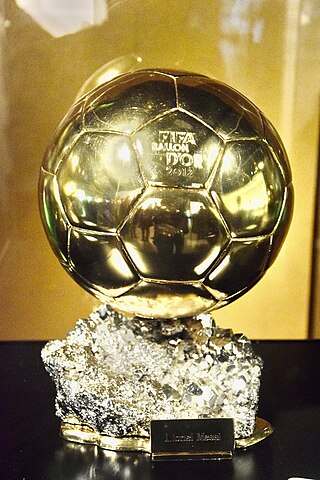
The Ballon d'Or is an annual football award presented by French magazine France Football since 1956 to honour the player deemed to have performed the best over the previous season.

Johannes Jacobus Neeskens was a Dutch football manager and player. A midfielder, he was an important member of the Netherlands national team that finished as runners-up in the 1974 and 1978 FIFA World Cups and is considered one of the greatest midfielders of all time. In 2004, he was named one of the 125 Greatest Living Footballers at a FIFA Awards Ceremony, while in 2017 he was included in the FourFourTwo list of the 100 all-time greatest players, at the 64th position.
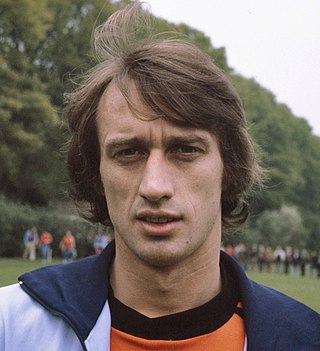
Pieter Robert Rensenbrink was a Dutch footballer and member of the Netherlands national team that reached two FIFA World Cup finals, in 1974 and 1978. A creative and prolific left winger or forward, he became a legend in Belgium while playing in the great Anderlecht sides of the 1970s. He is the UEFA Cup Winners' Cup's all-time top scorer, with 25 goals. A talented dribbler as well as a cool finisher and adequate passer, he only ever missed two penalties in his entire career. He was also the first winner of the Onze d'Or in 1976.

Franklin Edmundo Rijkaard is a Dutch former footballer and former manager who played as a defensive midfielder. Regarded as one of the best midfielders in footballing history, Rijkaard was described by British broadsheet The Daily Telegraph as having been "a stylish player of faultless pedigree".

Michel Georges Jean Ghislain Preud'homme is a Belgian retired footballer and manager who played as a goalkeeper. Currently, he is vice-president and sports director at Standard Liège.

Paul Guillaume van Himst is a Belgian former football player and a football manager who played as a forward, most notably for R.S.C. Anderlecht. Regarded as Anderlecht's ultimate club icon, Van Himst holds the record of four Belgian Golden Shoe awards and was named best "Belgian footballer of the twentieth century".

The 1994 Ballon d'Or, given to the best football player in Europe as judged by a panel of sports journalists from UEFA member countries, was awarded to Hristo Stoichkov on 20 December 1994.
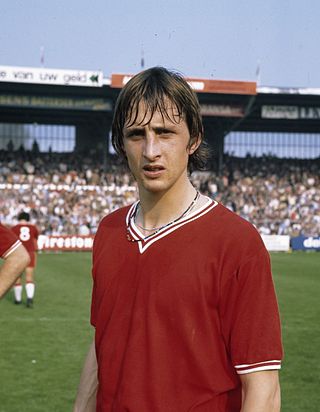
The 1971 Ballon d'Or, given to the best football player in Europe as judged by a panel of sports journalists from UEFA member countries, was awarded to Johan Cruyff on 28 December 1971.
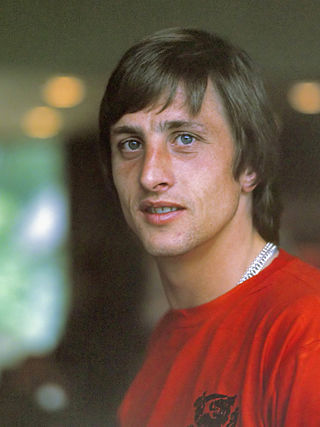
Hendrik Johannes Cruijff, commonly known as Johan Cruyff, was a Dutch professional football player and manager. Regarded as one of the greatest players in history and as the greatest Dutch footballer ever, he won the Ballon d'Or three times, in 1971, 1973, and 1974. Cruyff was a proponent of the football philosophy known as Total Football developed by Rinus Michels, which Cruyff also employed as a manager. Because of the far-reaching impact of his playing style and his coaching ideas, he is widely regarded as one of the most influential figures in modern football, and he is also regarded as one of the greatest managers of all time.

The 1973 Ballon d'Or, given to the best football player in Europe as judged by a panel of sports journalists from UEFA member countries on 25 December 1973. It was awarded to Dutch midfielder Johan Cruyff, for the second time.
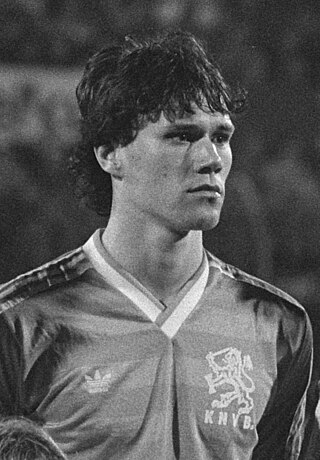
The 1988 Ballon d'Or, given to the best football player in Europe as judged by a panel of sports journalists from UEFA member countries, was awarded to Marco van Basten on 27 December 1988. There were 27 voters, from Albania, Austria, Belgium, Bulgaria, Czechoslovakia, Denmark, East Germany, England, Finland, France, Greece, Hungary, Italy, Luxembourg, the Netherlands, Poland, Portugal, Republic of Ireland, Romania, Scotland, Soviet Union, Spain, Sweden, Switzerland, Turkey, West Germany and Yugoslavia. Van Basten was the third Dutch national to win the award after Johan Cruyff and Ruud Gullit (1987).

The 1989 Ballon d'Or, given to the best football player in Europe as judged by a panel of sports journalists from UEFA member countries, was awarded to Marco van Basten on 26 December 1989. There were 27 voters, from Albania, Austria, Belgium, Bulgaria, Czechoslovakia, Denmark, East Germany, England, Finland, France, Greece, Hungary, Italy, Luxembourg, the Netherlands, Poland, Portugal, Republic of Ireland, Romania, Scotland, Soviet Union, Spain, Sweden, Switzerland, Turkey, West Germany and Yugoslavia. Van Basten was awarded to Ballon d'Or for the second time.
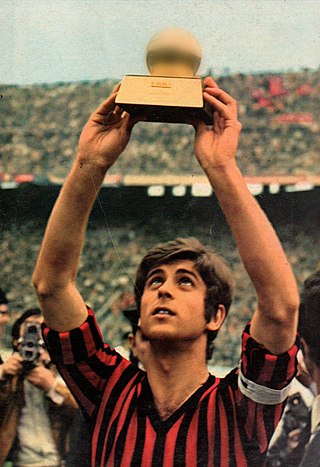
The 1969 Ballon d'Or, given to the best football player in Europe as judged by a panel of sports journalists from UEFA member countries, was awarded to the Italian midfielder Gianni Rivera (Milan) on 23 December 1969. There were 26 voters, from Austria, Belgium, Bulgaria, Czechoslovakia, Denmark, East Germany, England, Finland, France, Greece, Hungary, Italy, Luxembourg, the Netherlands, Norway, Poland, Portugal, Republic of Ireland, Romania, Soviet Union, Spain, Sweden, Switzerland, Turkey, West Germany and Yugoslavia. Rivera became the second Italian to win the award, after Omar Sívori in 1961. He was also the first Milan player to win the trophy.
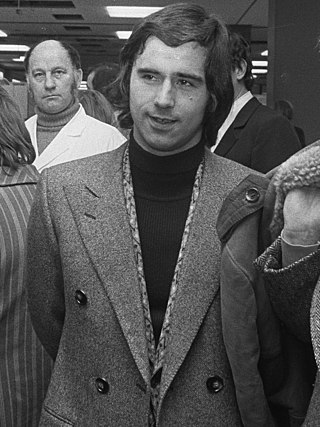
The 1970 Ballon d'Or, given to the best football player in Europe as judged by a panel of sports journalists from UEFA member countries, was awarded to the West German forward Gerd Müller on 29 December 1970. There were 26 voters, from Austria, Belgium, Bulgaria, Czechoslovakia, Denmark, East Germany, England, Finland, France, Greece, Hungary, Italy, Luxembourg, the Netherlands, Norway, Poland, Portugal, Republic of Ireland, Romania, Soviet Union, Spain, Sweden, Switzerland, Turkey, West Germany and Yugoslavia. Müller became the first West German national and the first Bayern Munich player to win the Ballon d'Or.
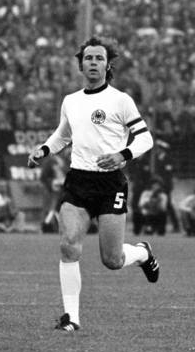
The 1972 Ballon d'Or, given to the best football player in Europe as judged by a panel of sports journalists from UEFA member countries, was awarded to the West German defender Franz Beckenbauer on 26 December 1972. There were 25 voters, from Austria, Belgium, Bulgaria, Czechoslovakia, Denmark, East Germany, England, Finland, France, Greece, Hungary, Italy, Luxembourg, the Netherlands, Poland, Portugal, Republic of Ireland, Romania, Soviet Union, Spain, Sweden, Switzerland, Turkey, West Germany and Yugoslavia. Beckenbauer became the second West German national and Bayern Munich player to win the trophy after Gerd Müller (1970).
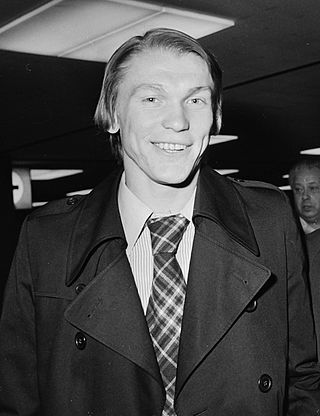
The 1975 Ballon d'Or, given to the best football player in Europe as judged by a panel of sports journalists from UEFA member countries, was awarded to the Soviet forward Oleg Blokhin on 30 December 1975. There were 26 voters, from Austria, Belgium, Bulgaria, Czechoslovakia, Denmark, East Germany, England, Finland, France, Greece, Hungary, Italy, Luxembourg, the Netherlands, Norway, Poland, Portugal, Republic of Ireland, Romania, Soviet Union, Spain, Sweden, Switzerland, Turkey, West Germany and Yugoslavia. Blokhin became the second Soviet footballer who won the trophy after Lev Yashin (1963).




















